- Reflections on my exchange in the UK
- Exchange Stories

Case Study: Exchange in the UK
Reflections on my exchange in the uk by pernille from denmark.

In August last year, Pernille from Denmark kindly wrote about her thoughts as she is prepared for her departure for her year exchange to the UK. She spoke of her nerves and excitement and determination to succeed, and now, 10 months later she has written about her experience and reflected on the opportunities and challenges she has faced.
Now that you are preparing to go home, how do you feel about your exchange experience?
It’s been such an amazing experience and I wouldn’t trade it for anything in the world. It’s been challenging and I’ve learned so many things and grown extremely much in such a short time. I’ve experienced so many things and met so many nice people while staying here and I couldn’t be more thankful for this opportunity.
What did you enjoy most about your time on exchange?
I know it’s a typical thing to say, but everything. I don’t think I can pick out one thing and say that I’ve enjoyed that more than another thing, because each thing I’ve experienced has a meaning to me in different ways.
How did you find living with a host family?
I am so pleased with the host family I got. They are all very nice and really good company. I’m really happy that I got to stay with them and get to know them. It has been a really fun experience to live with someone else and create this bond between us. They are so nice to you and treat you as you were a part of their family. They listen to what you have to say and make sure that you feel welcome and are happy.
What was it like meeting your family for the first time?
It was so weird and awkward (haha). It was weird meeting them because I’ve been talking to them before I came. They helped me feel welcomed and a part of the family from day one.
What challenges did you face when starting school?
It was not too easy making friends at the beginning because I had to settle in first. The language wasn’t difficult but it was still a challenge at the beginning that everything was in English. But of course it got better with time.
How did school in the UK differ from school in Denmark?
The school system in the UK is a bit different than in Denmark. For example I had a different class/classmates for each subjects because we chose our subjects ourselves. In Denmark you have one class for all subjects. And I got frees during the day so I didn’t go to school from 8-3 everyday with only one break, as in Denmark. It was nice trying something new. The teachers are nice and funny and we could always talk to them if we had something on our minds. The other students made sure I felt welcome as well, and I got a lot of really nice friends. In general, the school was such a nice place with lots of fun things to do. They even planned a trip to Bristol for our photography class.
Do you feel more confident speaking English and how will you keep practising when you are home?
I definitely feel more comfortable in my spoken and written English after these months. I don’t think as much about if what I say is right anymore as it comes more naturally. I plan to still have contact with my friends and host family so in that way I’ll keep up practising my English, and of course I’ll have English at my college when I go home.
Did you feel prepared for the exchange and supported by the staff?
I think so, yeah. We got a lot of information about the exchange before we left and while we were here, so I knew what I was going into, even though of course it’s different when you’re there. I could always contact my Area Rep if I had any problems so that was nice as well.
What advice would you give someone preparing for exchange?
I would first of all say, no matter what, don’t be afraid to ask for help if you’re in doubt of anything no matter how stupid you think it is. And then just make sure to be open, have an open mind and think positive. That will get you a long way!
Would you recommend an exchange to other people?
I have already recommended it to so many people. Being on exchange is a special thing and you learn and experience so many things while you’re away. I was surprised myself how much I’ve changed and learned. It’s something you can’t just experience by going on holiday to the country. Living there in the culture, in their environment gives you a better understanding about the country and the people. You see how other people live outside from your own country and that is an amazing thing! I think this is something every person should experience in their life.
What are your plans when you get home and has exchange influenced your plans for the future?
I’m starting college after summer holiday and then continuing my education after that. During the summer I’ll just work to earn money. The exchange made me realise how passionate I am about photography so it definitely influenced me to start working with my camera a lot more.
Pernille’s reflections on her experience highlight the fact that it does take work to make your exchange a success. Students have to be willing to be open and talk with their host family, classmates and local Area Representative. Her commitment to the experience helped her to make the most of her exchange and we congratulate Pernille for her effort and wish her every success in the future. We hope to see some of your photos from Denmark!

Become a host family or come to the UK on exchange

New knowledge exchange case studies resource
In today’s blog, we highlight our new knowledge exchange case studies resource; a bank of real-life case studies showcasing how some of our researchers have successfully incorporated knowledge exchange activities within their research projects.
Edinburgh Research Office’s Knowledge Exchange and Impact Team have developed knowledge exchange (KE) case studies which showcase the KE activities of some of our researchers within the College of Arts Humanities and Social Science (CAHSS). The case studies are available to all University of Edinburgh members of staff to read on our Edinburgh Research Office SharePoint site.
Read the case studies.
A broad variety of case studies
The resource includes a broad spectrum of case studies highlighting researchers’ experiences from across many different schools, including:
- Edinburgh College of Art;
- School of Economics;
- School of Social and Political Science;
- Business School;
- Moray House School of Education and Sport; and
- School of Philosophy, Psychology and Language Studies.
In the case studies researchers share their experiences, thoughts and reflections from their projects, and highlight the funding they secured to support their activities; all useful insights to help plan your own KE research activities.
Support with your knowledge exchange and impact planning
KE activities can help you to increase the impact of your research, and so it is important to integrate KE into your research project planning early on. If you are a researcher in CAHSS looking for support or guidance to do this, please contact our Knowledge Exchange and Impact Team at Edinburgh Research Office [email protected] .
We have also have developed online resources on our Edinburgh Research Office website including some KE and Impact “How to guides”.
Get involved and share your KE experiences
The Knowledge Exchange and Impact Team at Edinburgh Research Office will continue to add new case studies to this resource. If you’re a researcher based in CAHSS and would like to contribute your own case study – please get in touch with the team on [email protected] . We’d love to feature your research!

Leave a Reply Cancel reply
Your email address will not be published. Required fields are marked *
Save my name, email, and site URL in my browser for next time I post a comment.

HTML Text New knowledge exchange case studies resource / by blogadmin is licensed under a Creative Commons Attribution-NonCommercial-NoDerivatives CC BY-NC-ND 4.0
Plain text New knowledge exchange case studies resource by blogadmin @ is licensed under a Creative Commons Attribution-NonCommercial-NoDerivatives CC BY-NC-ND 4.0
Report this page
To report inappropriate content on this page, please use the form below. Upon receiving your report, we will be in touch as per the Take Down Policy of the service.
Please note that personal data collected through this form is used and stored for the purposes of processing this report and communication with you.
If you are unable to report a concern about content via this form please contact the Service Owner .
- Work & Careers
- Life & Arts
The case study: How BMW dealt with exchange rate risk

- The case study: How BMW dealt with exchange rate risk on x (opens in a new window)
- The case study: How BMW dealt with exchange rate risk on facebook (opens in a new window)
- The case study: How BMW dealt with exchange rate risk on linkedin (opens in a new window)
- The case study: How BMW dealt with exchange rate risk on whatsapp (opens in a new window)
By Xu Bin and Liu Ying
Simply sign up to the Currencies myFT Digest -- delivered directly to your inbox.
The story. BMW Group, owner of the BMW, Mini and Rolls-Royce brands, has been based in Munich since its founding in 1916. But by 2011, only 17 per cent of the cars it sold were bought in Germany.
In recent years, China has become BMW’s fastest-growing market , accounting for 14 per cent of BMW’s global sales volume in 2011. India, Russia and eastern Europe have also become key markets.
The challenge. Despite rising sales revenues, BMW was conscious that its profits were often severely eroded by changes in exchange rates. The company’s own calculations in its annual reports suggest that the negative effect of exchange rates totalled €2.4bn between 2005 and 2009.
BMW did not want to pass on its exchange rate costs to consumers through price increases. Its rival Porsche had done this at the end of the 1980s in the US and sales had plunged.
The strategy. BMW took a two-pronged approach to managing its foreign exchange exposure.
One strategy was to use a “natural hedge” – meaning it would develop ways to spend money in the same currency as where sales were taking place, meaning revenues would also be in the local currency.
However, not all exposure could be offset in this way, so BMW decided it would also use formal financial hedges. To achieve this, BMW set up regional treasury centres in the US, the UK and Singapore.
How the strategy was implemented. The natural hedge strategy was implemented in two ways. The first involved establishing factories in the markets where it sold its products; the second involved making more purchases denominated in the currencies of its main markets.
BMW now has production facilities for cars and components in 13 countries. In 2000, its overseas production volume accounted for 20 per cent of the total. By 2011, it had risen to 44 per cent.
In the 1990s, BMW had become one of the first premium carmakers from overseas to set up a plant in the US – in Spartanburg, South Carolina. In 2008, BMW announced it was investing $750m to expand its Spartanburg plant. This would create 5,000 jobs in the US while cutting 8,100 jobs in Germany.
This also had the effect of shortening the supply chain between Germany and the US market.
The company boosted its purchasing in US dollars generally, especially in the North American Free Trade Agreement region. Its office in Mexico City made $615m of purchases of Mexican auto parts in 2009, expected to rise significantly in following years.
A joint venture with Brilliance China Automotive was set up in Shenyang, China, where half the BMW cars for sale in the country are now manufactured. The carmaker also set up a local office to help its group purchasing department to select competitive suppliers in China. By the end of 2009, Rmb6bn worth of purchases were from local suppliers. Again, this had the effect of shortening supply chains and improving customer service.
At the end of 2010, BMW announced it would invest 1.8bn rupees in its production plant in Chennai, India, and increase production capacity in India from 6,000 to 10,000 units. It also announced plans to increase production in Kaliningrad, Russia.
Meanwhile, the overseas regional treasury centres were instructed to review the exchange rate exposure in their regions on a weekly basis and report it to a group treasurer, part of the group finance operation, in Munich. The group treasurer team then consolidates risk figures globally and recommends actions to mitigate foreign exchange risk.
The lessons. By moving production to foreign markets the company not only reduces its foreign exchange exposure but also benefits from being close to its customers.
In addition, sourcing parts overseas, and therefore closer to its foreign markets, also helps to diversify supply chain risks.
The writers are, respectively, professor of economics and finance and associate dean of research, and a research associate at CEIBS
Promoted Content
Follow the topics in this article.
- Currencies Add to myFT
- European companies Add to myFT
- UK companies Add to myFT
- Work & Careers Add to myFT
- Companies Add to myFT
International Edition
Browser does not support script.
- Departments and Institutes
- Research centres and groups
- Chair's Blog: Summer Term 2022
- Staff wellbeing

KEI case studies
Examples of knowledge exchange and engagement activities at lse.
Knowledge exchange can happen with any non-academic audiences, and there are many ways to engage these audiences with your research.
LSE supports a variety of approaches and methods for engagement with all kinds of audiences throughout the research life cycle. Here you will find just a few examples of the innovative work being done around the School.
For more KEI inspiration see Central KEI Initiatives and Methods and Activities for Supporting KEI , and read through our guide to planning your KEI . To discuss the most effective activities for your research please contact the KEI Integrated Service, [email protected] .
Browse these case studies:
Reinventada
Topic: Migrant Women in Medellín and Their Right to the City
The project co-produced remotely a 32-minute documentary of the everyday lives of 12 women in Medellin, Colombia during the COVID-19 pandemic 2020/2021. In collaboration with the 12 women, researchers and filmmakers in Colombia and the UK the team developed a pioneering participatory video methodology using participants smartphones for filming, editing and online discussion and reflection activities. The film illustrates issues that already have been challenging for the women before the pandemic such as inequality, poverty and insecurity but also highlights new insights such as the importance of gardens for food security and mental health as well as mutual aid activities that took place.
In addition to developing a new methodology, this project enhanced women’s capacities through skill development, learning to use their smartphones for filming but also to join online activities such as Zoom meetings and sending data online.
The film was screened at film festivals, Royal Geographical Society film geographies conference and at local Medellin events and online.
Students and the education sector have benefited through viewing the film and the sharing of lessons learned in the development of a remote participatory video project.
This KEI project produced process-driven impact that created long-term skill development, capacity building and solidarity networks for the women.
Their beneficiaries (research users, partners and audiences) are:
- Migrant women in Medellin, Colombia and the wider local community
- NGO Con Vivamos
- Spectacle Training - a participatory video filming company
- Local policymakers
- Students and education sector in the UK
Hear more about the project in this video or read this article Collaborating in a pandemic: empowering migrant women in Colombia to tell their stories
Adolescents and abortion: Ethiopia, Malawi and Zambia
The team worked with NGO Ipas and creative agency PostiveNegatives alongside youth champions to co-create animated films and comics that would amplify girls’ voices, reach adolescents and educate and inform around the legal options for abortion-related care in Ethiopia (Kokeb’s Story), Malawi (Mphatso’s Story) and Zambia (Mwansa’s Story). Made in multiple languages, these were shared online and through networks on platforms like WhatsApp and YouTube.
KEI funding led to a further award from the Medical Research Foundation to continue work with an Africa-focused communications specialist, and using the project outputs to create training for healthcare workers.
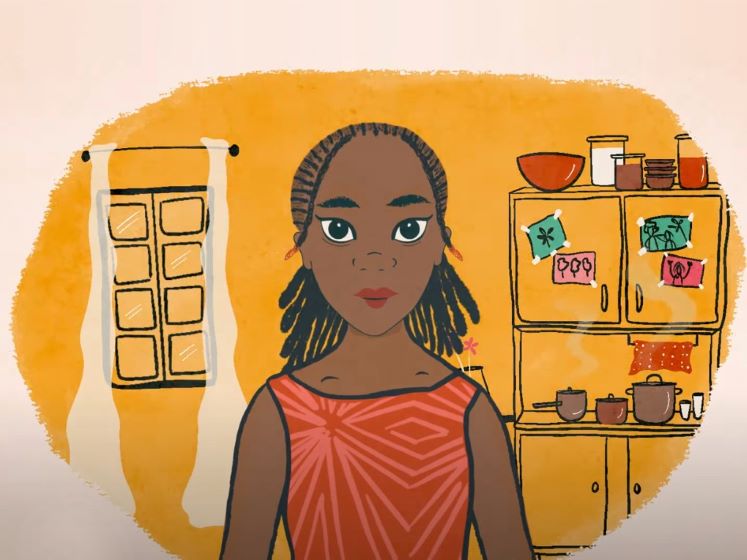
- Adolescents aged 10-19 years in Ethiopia, Malawi and Zambia
- IPAS, The International Campaign for Women's Rights to Safe Abortion
- World Health Organisation
Read more about the project
Climate Change Laws of the World database
The Grantham Research Institute on Climate Change and the Environment (GRI)’s Climate Change Laws of the World database is the world’s largest database covering climate change-related legislation and policy.
Analytical and comparative tools make the data accessible to a broad non-academic audience.
- World Resources Institute
- Policy makers, parliamentarians, negotiators (globally)
- International organisations e.g. UNFCCC, UNEP, Inter-Parliamentary Union (IPU), International Renewable Energy Agency (IRENA), International Energy Agency (IEA)
- Institutional investors (e.g. pension funds) and green investment initiatives (e.g. the Transition Pathway Initiative, Climate Action 100+) (globally)
- Civil society, including media; NGOs; the general public (globally)
Almanac of Electoral Ergonomics
The project created an online database to showcase electoral data for every democracy in the world. It is based on the concept of electoral ergonomics, a term that assumes that all small aspects of electoral design – such as the format of ballot papers, or the mode of remote voting used (internet, postal, advance, etc) which had so far been largely assumed to be neutral actually affect voters’ satisfaction, turnout and electoral choice.
The almanac also features information regarding an “effective access to the vote”, which aggregates all aspects of registration, vulnerable categories accessibility, and ability to vote for all citizens on Election Day into one measure which we wish to promote as a key metric of the quality of electoral democracy across systems.
This online compendium highlights examples of best practice and it has become an important resource for practitioners in the field of electoral management. The resource is fully searchable by country, category, and instruments with significant interactive content. Overall, the aim was to improve the quality of electoral democracy by providing decision makers and influencers with research based-knowledge understanding of how the choices that they make in each aspect of the design and organisation of electoral procedures affects the attitudes (satisfaction, efficacy, sense of representation, trust), their turnout, and potentially distorts the electoral choice of voters in general and specific under-represented categories (first time voters, disabled voters, vulnerable minorities).
- Election management bodies (international)
- Commonwealth parliamentary association
- International organisations and NGOs including European Commission, Committee of the Regions, Counterpoint, Open Society, European Youth Forum, Electoral Stakeholders Network, International Centre for Parliamentary Studies
- Citizens, particularly first time voters, disabled voters, vulnerable minorities
Global Kids Online
Topic: children's use of the internet
This international research project generated and sustained a rigorous cross-national evidence base around children’s use of the internet by creating a global network of researchers and experts.
The team created a best practice training and toolkit, policy and practice briefs, child-friendly resources (created with the participation of children) to promote digital citizenship, and resources for parents and teachers.
Their beneficiaries (research users, partners and audiences) were:
- UN Committee on the Rights of the Child
- Internet Governance Forum
- World Summit on the Information Society
- International Telecommunications Union
More information

Configuring Light
Topic: social inequalities in public lighting
This interdisciplinary research programme explored the role lighting plays in our everyday lives, to help build a better social knowledge basis for lighting design interventions. It has centred on collaborations with designers, developers and municipalities. Projects explore how lighting is configured into social life: as infrastructure, as technology, as ambiance or as a particular kind of material that we make and shape through our everyday practices and professional expertise. The KEI Fund supported a project tackling social inequalities in public lighting, focussing on an urban space in Southwark.
The team created a website, film, handbook, report and exhibition. They held workshops, a training session and a symposium.
- Local community members
- Social scientists
- Lighting design professionals
- Urban professionals
- Urban designers
- Local authority
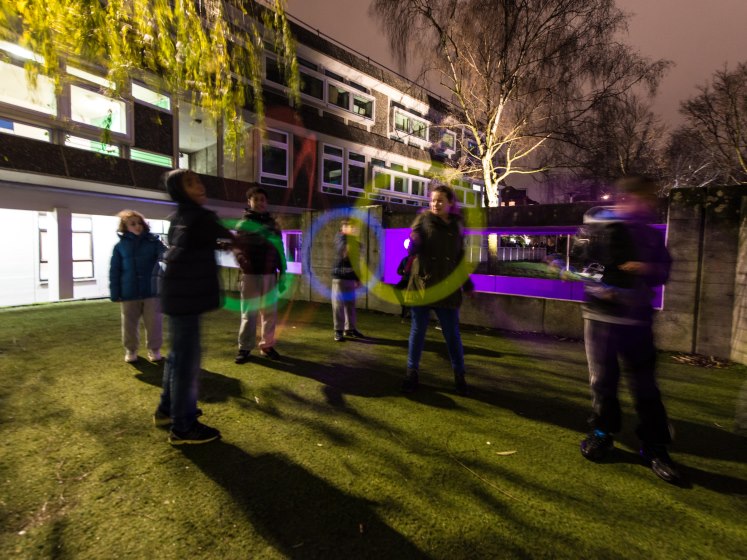
Topic: Egg freezing and fertility
In this public engagement project, the team created a fictional beauty brand to inform and engage women in thinking about their options around social egg freezing and fertility. They also raised public debate on how these advances in biomedical science may impact on the world of work, relationships and wider society.
The team held a pop-up shop in London, interactive workshops, graphic visualisations, talks and exhibitions. They made two short films, a website, and produced media articles and engagement.
- Researchers
- Wider publics
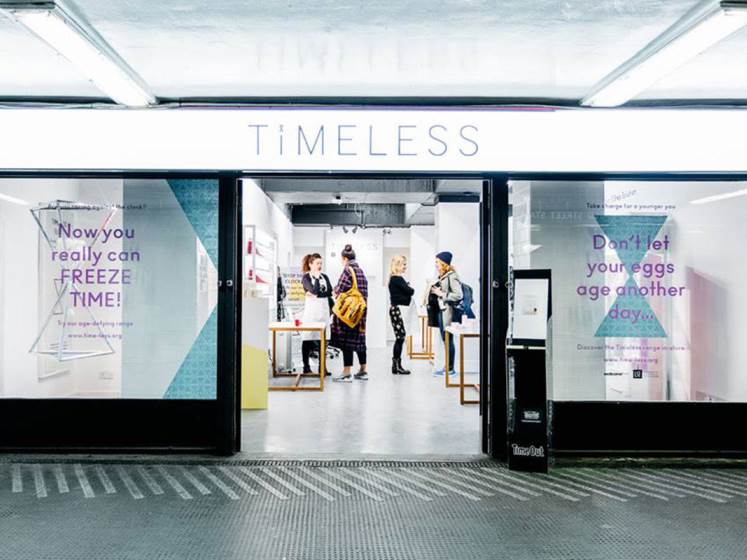
Housing Plus
Topic: housing policy for practitioners and policy-makers
This project used the research expertise in LSE Housing and Communities, and CASE, to develop new thinking and solutions for the complex, interacting problems of housing, poverty, work, community and environment.
The Housing Plus Academy promoted knowledge exchange and participative learning among decision-makers, frontline staff and tenants of social landlords; tackling problems affecting both housing association and local authority landlords, such as benefit cuts, Universal Credit financial pressures, energy saving, work and skills, community enterprise, estate regeneration, private renting, community resilience, supported housing and housing young people.
They produced a practical guide for practitioners and policy-makers, held themed residential ‘think-tank’ days, morning roundtable sessions and a policy forum, and created a Housing Plus Network.
- Businesses and industry
- Public sector bodies
- Charities and the third sector
- Private and social housing tenants
- Builders and Developers
- Engineers, architects, construction and energy companies
Topic: the perspectives of autistic people
Open Minds was an exhibition to improve public understanding of the unique perspectives of autistic people. It contained posters, sensory installations and an augmented reality experience. There were also recorded talks and workshops.
- People with autism spectrum conditions
- Research community
- Parents/carers of autistic people
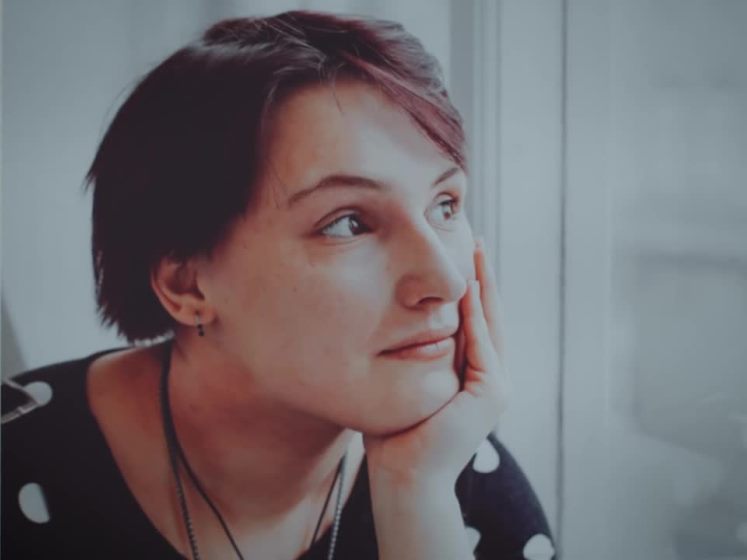
Tackling the War on Drugs
Topic: drug policy reform in Ireland
As part of the work of the International Drug Policy Unit at LSE, this KEI project aimed to meaningfully engage police, the public and key stakeholders in drug policy reform in Ireland. The overall aim was to sensitise audiences to the evidence in relation to drug policy, thereby providing people with the knowledge to regard existing assumptions with a critical eye.
The team produced a comic book series highlighting the life situations of drug involved individuals and how they interact with society, a series of posters and short factsheets on key drug policy topics for use in media and townhalls, a feature length piece on the project for publication in national and local media, and a podcast. They held town hall sessions in locations around Ireland and a policy summit on law enforcement and policy change.
- Affected population
- Civil society actors
- Community leaders and activists
- Local politicians and policy makers
- Local businesses
- Local health services
- Local law enforcement
- Senior police
- Public health professionals
- Government ministers
- International policy audiences

Other case studies for inspiration:
Africa Centre - The Politics of Return included an arts residency and exhibition. Browse the When we Return art catalogue .
Working with serendipity to produce impact - LSE Impact blog Policy impact in South Sudan
New tech can help tackle domestic violence: improving the UK Government’s Domestic Abuse Bill
Aspect: Methods for Change Read through case studies from our Aspect network partners exploring a range of social science methodologies that lend themselves to collaborations, particularly with artists and designers, and reach an audience beyond academia.

Use the KEI Guide a step by step guide to knowledge exchange and impact
Kei guide practical advice.
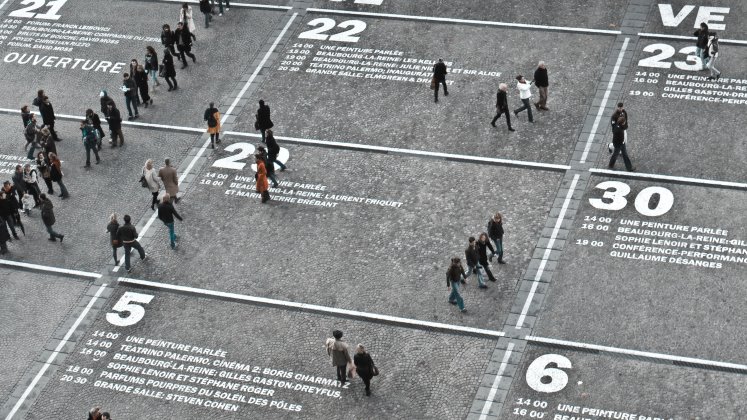
KEI Inspiration Examples of audiences and beneficiaries of impact

KEI Inspiration Examples of methods and activities for supporting KEI

KEI Inspiration Examples of KEI metrics and indicators

KEI Inspiration Advice from those involved
- QMU Research
- RKE Case Studies
Research and Knowledge Exchange Case Studies
What is distinctive about QMU’s approach is our rootedness in the intersection of conventional disciplinary groupings to create innovative approaches to contemporary societal challenges and public discourse and the identification of entrepreneurial opportunities both locally and internationally. This activity supports the exchange of research and knowledge into real-life solutions, and we are making a significant impact in addressing social, economic, cultural and health issues.
Read examples of how and where our research, knowledge exchange and enterprise creation is making a difference.
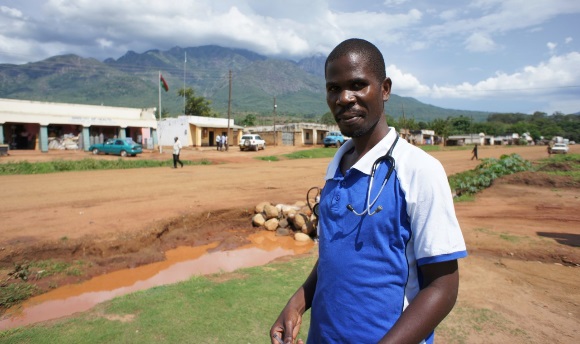
Research and Knowledge Exchange Development Unit
Pages you might like.
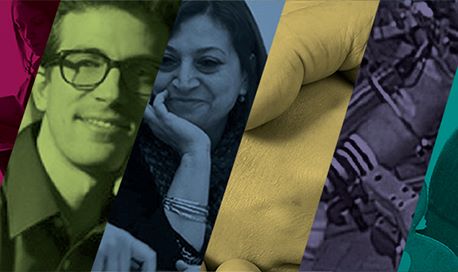
Our Work with Business & Industry

Knowledge Exchange and Impact Case Studies
Enhancing knowledge exchange with wider communities and conducting innovative impactful research are at the centre of our research objectives and activities. Here are some of the KE activities we have conducted, and the impact case studies Centre members have carried out for REF 2014 and REF2021.
Preserving London-French Web Heritage
Dr. Saskia Huc-Hepher has submitted an Impact Case Study for the REF 2021 (Modern Languages and Linguistics Unit of Assessment), entitled Preserving London-French Web Heritage.
Read more

Collaboration with the British Alevi Federations and Schools
Dr. Celia Jenkins and Dr. Umit Cetin continue to collaborate with the British Alevi Federations and schools to introduce Alevism lessons into the religious education curriculum in schools.
London’s Greek Cypriot Diaspora and its Languages
Initial work was done by Dr. Petros Karatsareas on a potential impact case study in relation to his research on London’s Greek Cypriot diaspora and its languages. This was not included in the REF.
Read more
Linguistics in MFL Project
Dr. Jonathan Kasstan develops impact through the Linguistics in MFL Project which includes a heritage languages component.
The London French: Food, Language and History
Professor Debra Kelly is the Lead Researcher and Author of REF 2014 Impact Case Study: The ‘London French’: Temporal and Spatial Mapping of the French Presence in the British Capital from the 17th Century to the Present Day. Named in REF 2021 Impact Case Study: The London French: in history and in the contemporary city, on-land and on-line .
Cultural Diversity, Migration Integration and Youth Action
Professor Terry Lamb is research lead in an EU-funded project titled ‘Home Away from Home’ (HAFH). In partnership with HOMELandS, HAFH organised a public event, titled ‘Cultural Diversity, Migration Integration and Youth Action: New Perspectives and Innovative Practices’, at University of Westminster, on 3rd July 2019.
Special Collection of the Chinese and ESEA for the UK Web Archive
Doctoral Researcher Xiao Ma curated the first ever Special Collection for the Chinese in the UK and East and Southeast Asians, for the UK Web Archive, hosted by the British Library and overseen by Saskia Huc-Hepher.
The Art Response to Migration: Reframing the Cultural Narrative of Contemporary Migration
Dr. Federica Mazzara's research, showcased in the Sink Without Trace exhibition, uses contemporary art to reshape mainstream discourse on migration in Europe. She is the Lead Researcher and Author of REF 2021 Impact Case Study: The Art Response to Migration: Reframing the Cultural Narrative of Contemporary Migration .
Reproductive Health of Factory Women Migrant Workers
Professor Lilian Miles was part of the team (Stumbitz, Miles, Lewis, Freeman & Lyon) which led the research and developed an Impact Case Study submitted by Middlesex University ( Extending Maternity Protection and Reproductive Rights at Work in the Global South ) to REF2021.
Italian Emigration
Julia Pepe was the co-organiser of the event “Mobilita’ internazionale dalle universita’ italiane” –Italian Consulate in London - February 2020. In addition, she was the organiser of the event “Moving Identities: Italian emigration in the contemporary world” – University of Westminster, in collaboration with the Italian Embassy and the Italian Consulate, London - October 2019.
HOMELandS Dialogue Series
We have organised three consecutive HOMELandS Dialogue events since 2022 to enhance knowledge exchange between the University, NGOs, advocacy groups, cultural institutes and migrant and refuges communities on a range of issues related to migration, EDI and social integration.
We use cookies to ensure the best experience on our website.
By accepting you agree to cookies being stored on your device.
Some of these cookies are essential to the running of the site, while others help us to improve your experience.
Functional cookies enable core functionality such as security, network management, and accessibility.
Analytics cookies help us improve our website based on user needs by collecting information, which does not directly identify anyone.
Marketing cookies send information on your visit to third parties so that they can make their advertising more relevant to you when you visit other websites.
The UK: A Case Study
Cite this chapter.

- Peter Curwen
11 Accesses
Privatization and liberalization are further advanced in the UK than elsewhere in the EU (removal of the last remaining vestige of monopoly power, the restriction on companies other than BT and Mercury owning and operating their own circuits for international calls, took place in 1996), and lessons can accordingly be learned from experience there. It is important to note from the outset, however, that whereas AT&T has suffered divestiture and subsequently lost a considerable part of its remaining long-distance market, British Telecommunications (BT) has so far lost less than 20 per cent of the overall market for telecoms services, and far less specifically in voice telephony where, in March 1996, it was estimated by OFTEL to control 94 per cent of local calls, 83 per cent of national calls and 70 per cent of international calls. BT is predicted to relinquish only a further 3–4 per cent per annum for the foreseeable future, with an OFTEL estimate of an overall market share of 65 per cent in 2001, although that disguises the extent of competitive pressures in particular markets.
This is a preview of subscription content, log in via an institution to check access.
Access this chapter
- Available as PDF
- Read on any device
- Instant download
- Own it forever
- Durable hardcover edition
- Dispatched in 3 to 5 business days
- Free shipping worldwide - see info
Tax calculation will be finalised at checkout
Purchases are for personal use only
Institutional subscriptions
Unable to display preview. Download preview PDF.
You can also search for this author in PubMed Google Scholar
Copyright information
© 1997 Peter Curwen
About this chapter
Curwen, P. (1997). The UK: A Case Study. In: Restructuring Telecommunications. Palgrave Macmillan, London. https://doi.org/10.1057/9780230375451_11
Download citation
DOI : https://doi.org/10.1057/9780230375451_11
Publisher Name : Palgrave Macmillan, London
Print ISBN : 978-1-349-40519-0
Online ISBN : 978-0-230-37545-1
eBook Packages : Palgrave Business & Management Collection Business and Management (R0)
Share this chapter
Anyone you share the following link with will be able to read this content:
Sorry, a shareable link is not currently available for this article.
Provided by the Springer Nature SharedIt content-sharing initiative
- Publish with us
Policies and ethics
- Find a journal
- Track your research
- Teaching, learning and quality
Changing the culture: directory of case studies
Last updated on Tuesday 20 Dec 2022 at 10:26pm
Since the publication in October 2016 of Changing the culture: report of the Universities UK Taskforce examining violence against women, harassment and hate crime affecting university students, universities and students’ unions have been continuing to evolve thinking and best practice.
This directory of case studies details responses from universities, including a wide range of innovative projects, from improving incident reporting procedures, to improving student and staff training in this area. It is a developing resource bank that will continue to grow as universities share initiatives and experiences within the UK and internationally.
Stay up to date with our work
Our monthly updates are a great way for you to stay up to date with our work, events, and higher education news.
- Opportunities
- How we help

Our connections don’t make the difference. They are the difference. Discover stories of how our involvement is increasing investment in innovation leading to positive economic, societal, and environmental change – regionally, nationally and globally.
Case Studies
- All Sectors Agrifood Biotechnology Chemistry Covid 19 Creative Industries Design Digital Electronics Energy Geospatial Global Health Industrial Maths Infrastructure Innovation Investment Knowledge Transfer Partnerships Manufacturing Materials Photonics Quantum Robotics & AI Security & Defence Sensors Space Sustainability Transport Water
- All UK Regions East Midlands (2) London and the South East (11) North West (England) (4) Northern Ireland (1) Scotland (6) South West (England) (3) Wales (1) West Midlands (4) Yorkshire and The Humber (3)
- All International Regions Africa (2)
- All Tagged Filtering AI (2) Analysis for Innovators (20) Biomedical Catalyst (5) BridgeAI (1) Cancer Therapeutics (1) Crops (1) Global Alliance Africa (2) Innovation Exchange (3) Women in Innovation (10)

Scottish and Southern Electricity Networks Transmission and InterBolt: Overhead conductor line sag measurement

Innovation Exchange Challenge unlocks carbon-neutral offshore wind subsea protection

Innovation Exchange Challenge sparks NUVIA UK and Lucideon’s solution to tackle hazardous nuclear waste
Connect with innovate uk business connect.
Join Innovate UK Business Connect's mailing list to receive updates on funding opportunities, events and to access Innovate UK Business Connect's deep expertise. Please check your email to confirm your subscription and select your area(s) of interest.
I agree to receive communications from Innovate UK Business Connect in accordance with Innovate UK Business Connect's Privacy Policy .

Alternatively, use our A–Z index
Manchester's structural integrity expertise enhances AMEC's nuclear industry assessment procedures.
Within the statutory framework that regulates the nuclear industry, there is an overriding requirement to demonstrate that all associated hazards are understood, effectively managed and controlled. Structural integrity assessments are conducted in accordance with the R6 document that outlines internationally recognised and validated procedures. R6 is owned by EDF and developed by a consortium of organisations, including AMEC.
To maintain its leading structural integrity capability, AMEC must have exposure to, and produce, state-of-the-art methodology for nuclear operating companies.
Building on previous joint collaborative projects, technical specialists from AMEC and The University of Manchester’s Dalton Nuclear Institute identified that a Knowledge Exchange 'Exploitation Secondment' undertaken by Dr Robert Hurlston would be an efficient route to meet this challenge.
- Download the AMEC case study (PDF document, 5.6MB)
Contact the Knowledge Exchange team
Knowledge exchange can improve your products and processes, making your organisation more competitive and profitable. Call us on +44 (0) 161 306 6815 or send us an email.
Email the Knowledge Exchange team
Pfizer reports patient death in Duchenne gene therapy study
- Medium Text

- Company Pfizer Inc Follow
Sign up here.
Reporting by Pratik Jain in Bengaluru; Editing by Shailesh Kuber
Our Standards: The Thomson Reuters Trust Principles. New Tab , opens new tab

Business Chevron
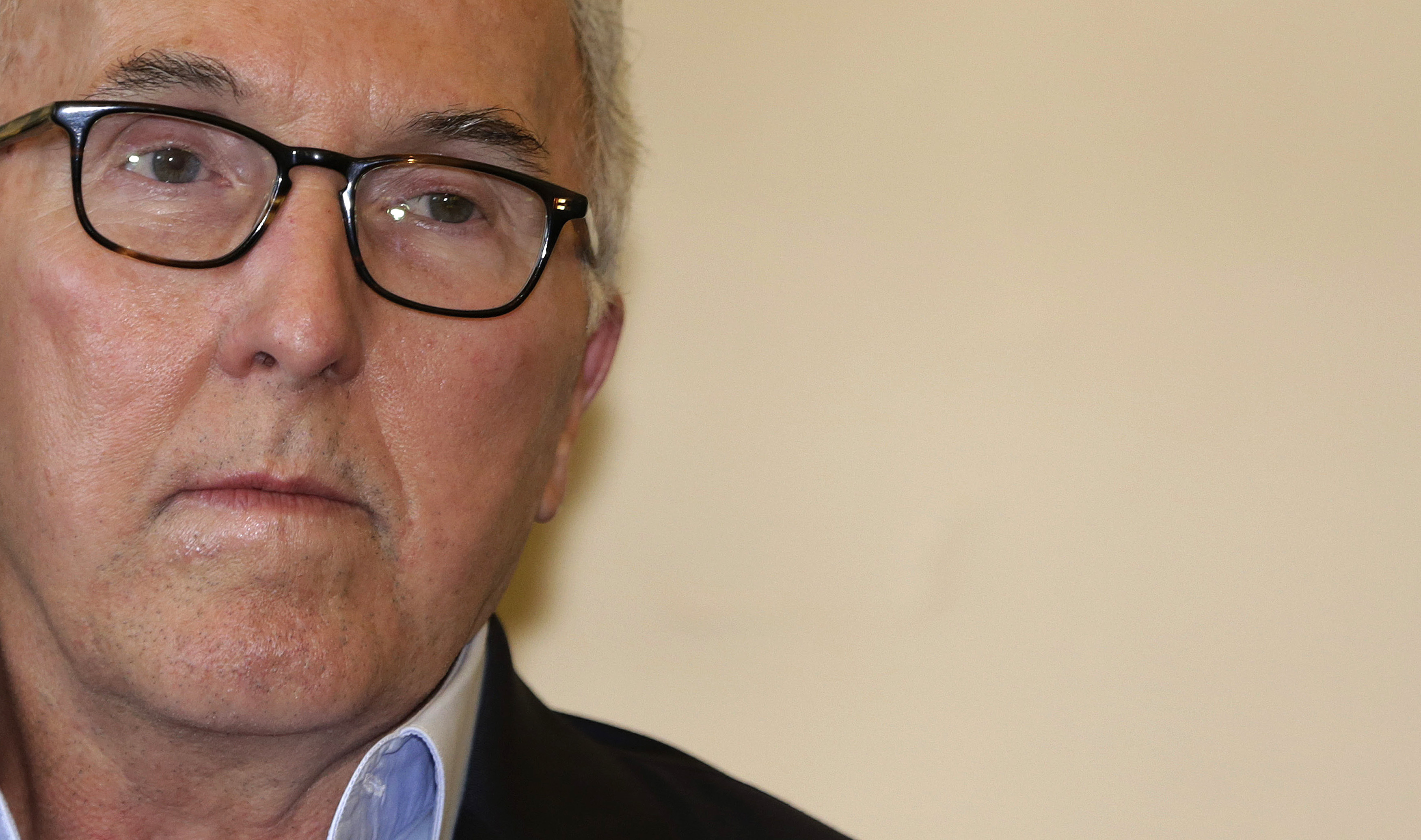
Frank McCourt's Project Liberty forms consortium to bid for TikTok's US operations
Entrepreneur and former Los Angeles Dodgers owner Frank McCourt said on Wednesday his non profit Project Liberty is forming a consortium to buy social media platform TikTok in the United States.


IMAGES
VIDEO
COMMENTS
Case Study: Exchange in the UK. Reflections on my exchange in the UK by Pernille from Denmark. In August last year, Pernille from Denmark kindly wrote about her thoughts as she is prepared for her departure for her year exchange to the UK. She spoke of her nerves and excitement and determination to succeed, and now, 10 months later she has ...
Stock exchange analysis is regarded as a stochastic and demanding real-world setting in which fluctuations in stock prices are influenced by a wide range of aspects and events. In recent years, there has been a great deal of interest in social media-based data analytics for analyzing stock exchange markets. This is due to the fact that the sentiments around major global events like Brexit or ...
Brexit, the withdrawal of the United Kingdom (UK) from the European Union (EU), has led to significant exchange rate fluctuations and to uncertainty in financial markets and in UK-EU trade relations. In this article, we use a non-linear model to study how this uncertainty affects export companies. Exports tend to react in spurts when exchange rate fluctuations go beyond a band of inaction ...
The case study exchange program used here is perhaps more strategically designed than some educational exchange initiatives. Longer-term academic grant programs tend to be more open-ended and loosely structured, whereas short-term exchange visits, such as the one in Pacher's study, tend to be more carefully planned and structured.
The London Stock Exchange (the Exchange) is Europe's leading stock exchange and the third largest in the world. Established in 1800, it plays a vital role in positioning London as a major financial centre and lists more than 2,800 securities, both UK and international. Its market regulation activities are fundamental to the UK's ...
The Knowledge Exchange and Impact Team at Edinburgh Research Office will continue to add new case studies to this resource. If you're a researcher based in CAHSS and would like to contribute your own case study - please get in touch with the team on [email protected] . We'd love to feature your research! May 7, 2020.
The challenge. Despite rising sales revenues, BMW was conscious that its profits were often severely eroded by changes in exchange rates. The company's own calculations in its annual reports ...
A copy of the best report was returned to the students who had written the original case study. So, whilst the UK-based students enjoyed the motivation of using case studies that had been prepared with them in mind, the Finnish cohort were also motivated by the fact that their writing was serving an authentic pedagogical purpose.
London Stock Exchange Group's (LSEG) 10-year, multi-billion-dollar strategic partnership with Microsoft for next-generation data and analytics and cloud infrastructure solutions represents the next stage in LSEG's transformation into the leading global financial markets infrastructure and data provider. Following LSEG's $27bn acquisition ...
Other case studies for inspiration: Africa Centre - The Politics of Return included an arts residency and exhibition. Browse the When we Return art catalogue. Working with serendipity to produce impact - LSE Impact blog Policy impact in South Sudan. New tech can help tackle domestic violence: improving the UK Government's Domestic Abuse Bill
This report comprises case studies from five participants from the Knowledge Exchange programme, drawn from across the programme's duration. It accompanies an evaluation report into the impact of the programme for participants. The evaluation report and case studies were commissioned by The British Museum to assess the
Since the late 1980s, "internationalization has become the main objective: more exchange, more degree mobility, and more recruitment" (Brandenburg and de Wit Citation 2011, 16). ... Exploratory case study. Given the importance of the UK in the EU academic system, we explored the responses of non-UK HEIs by carrying out an exploratory study ...
The Adaptation and Resilience in the Context of Change (ARCC) network championed the premise that knowledge exchange between academic researchers and policy and practice communities is crucial to delivering research benefits across the UK economy and society. A careful balance is required between the various types of engagement provided to ...
Research and Knowledge Exchange Case Studies. What is distinctive about QMU's approach is our rootedness in the intersection of conventional disciplinary groupings to create innovative approaches to contemporary societal challenges and public discourse and the identification of entrepreneurial opportunities both locally and internationally.
Going direct: a Wise decision. Not every listing on the public markets has the aim of raising fresh capital. For fast-growing international technology company Wise, its Direct Listing on the Main Market of London Stock Exchange provides a way to broaden its ownership while remaining focused on its mission. Co-founder and CEO Kristo Käärmann ...
Professor Debra Kelly is the Lead Researcher and Author of REF 2014 Impact Case Study: The 'London French': Temporal and Spatial Mapping of the French Presence in the British Capital from the 17th Century to the Present Day. Named in REF 2021 Impact Case Study: The London French: in history and in the contemporary city, on-land and on-line.
Privatization and liberalization are further advanced in the UK than elsewhere in the EU (removal of the last remaining vestige of monopoly power, the restriction on companies other than BT and Mercury owning and operating their own circuits for international calls, took place in 1996), and lessons can accordingly be learned from experience there.
By working together, The University of Manchester and our knowledge exchange partners find solutions to real industry challenges. Over the past five years we have supported more than 250 knowledge exchange projects with companies ranging from large multinationals and regional SMEs to public sector bodies and charities. Find out how we've ...
Changing the culture: directory of case studies. Since the publication in October 2016 of Changing the culture: report of the Universities UK Taskforce examining violence against women, harassment and hate crime affecting university students, universities and students' unions have been continuing to evolve thinking and best practice.
For more information about the Knowledge Exchange Unit, or advice on working with UK Parliament as a researcher, contact the Knowledge Exchange team on [email protected] . Sarah Carter-Bell, Knowledge Exchange Lead. Rakhi Biswas Evans, Knowledge Exchange Manager. Michelle Ntow, Knowledge Exchange Officer. Jenny Chapman, Knowledge Exchange Manager.
Contact the Knowledge Exchange team. Knowledge exchange can improve your products and processes, making your organisation more competitive and profitable. Call us on +44 (0) 161 306 6815 or send us an email. Discover examples of how University of Manchester research is having real-world impact on economies, societies and cultures, via our ...
Case Studies. Our connections don't make the difference. They are the difference. Discover stories of how our involvement is increasing investment in innovation leading to positive economic, societal, and environmental change - regionally, nationally and globally. You Are Viewing: innovation exchange × View All.
Building on previous joint collaborative projects, technical specialists from AMEC and The University of Manchester's Dalton Nuclear Institute identified that a Knowledge Exchange 'Exploitation Secondment' undertaken by Dr Robert Hurlston would be an efficient route to meet this challenge. Download the AMEC case study (PDF document, 5.6MB)
A young patient died due to cardiac arrest after receiving Pfizer's experimental gene therapy being tested in a mid-stage trial for a muscle-wasting disorder called Duchenne muscular dystrophy(DMD ...